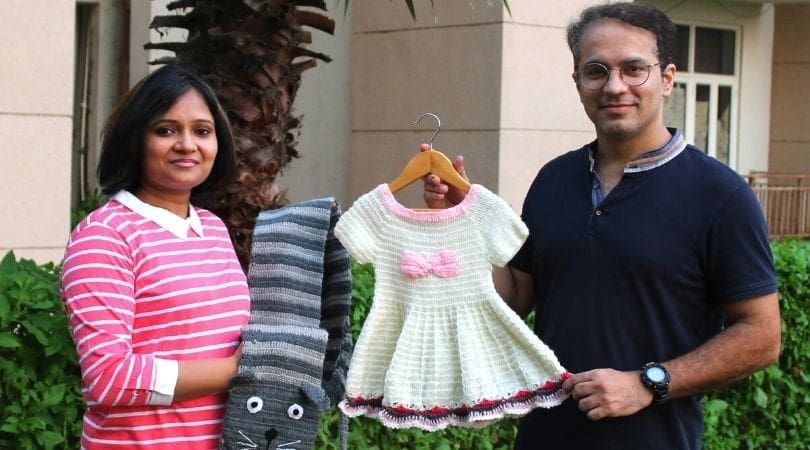“Sitting next to my grandmothers and learning how to knit and crochet was one of the fondest memories from my childhood. My grandmother would guide me softly to the complex twists and turns of the yarn and the threads in which one worked. In the end, a lovely muffler, a jumper, or a handkerchief with beautiful lace would be the outcome.”
These handcrafted items started to vanish over the course of time and were
replaced by mass-produced machine-made products, which entrepreneur Tarishi Jain always considered to be a loss. Her mother-in – law knitted a stunning frock in 2015, when she was pregnant with her daughter, and she was absolutely taken by it. Skilled in knitting and crocheting, she chose to take it up again.
“I had always loved engaging in these activities but had lost touch over time. Seeing the beautiful frock, I was taken back to the time when I crocheted and made beautiful tv covers, handkerchiefs, and laces. So, I decided to try my hand at it again and in two days, I too had made a beautiful frock for my daughter,” recalls the 34-year-old.
Over time, her friends and acquaintances would ask her to knit things for their babies after discovering these exquisite handcrafted objects. The demand only increased, which forced Tarishi to find more individuals who were aware of the art of knitting and crocheting. She also thought that she could help many women who could work from the comfort of their homes by starting a business.
Now, almost four years later, in a month, Ajoobaa gets about 4,000 orders! The business has dressed at least 20,000 kids in the last year. Actually, 112 artisans are working with them, mainly homemakers who produce these beautiful items by hand. Despite handling its activities on a small scale, Ajoobaa has had an annual turnover of Rs 1.4 Crore in the past year.
How it began
“I began by asking my house-help if she knew any women who were skilled in knitting and crochet work. She was happy to put me in touch with these women. I would share a design sample with them and they were able to replicate it beautifully. This helped me keep faith in the fact that this is in fact be a successful business,” informs Tarishi.Most of the orders were taken through Instagram and the customer base grew through word of mouth.
The development
“Although the artisans work from the comfort of their homes, we still have a 1400 sq feet collection centre where all the finished products are consolidated and carefully sorted. In the case of the raw materials, the wool is sourced from vendors in Ludhiana and is provided to the artisans along with buttons, threads, and other embellishments,” informs Tarishi.
Currently, there are frocks of over 250+ designs, 100 sweaters designs, over 150 different kinds of booties, and approx 100 different kinds of caps. Additionally, they also have mufflers and accessories like hair clips, hairbands, ear muffs, and leg warmers. All the products are priced between Rs. 125 to Rs. 1500 which is considerably affordable and this is what attracted a lot of customers.
The artisans
Sixty-year-old Jaidevi is a head artisan working with Ajoobaa who manages a group of 25 artisans. The homemaker learned how to knit and crochet from her mother-in-law. Over time and after her husband passed away, she shares that she lost touch with knitting and crocheting. Her three sons also grew up and got married but Jaidevi found it extremely difficult to pass time without doing anything.
So, when Ajoobaa’s team started hunting for artisans who could work with them, Jaidevi was more than obliged.
“They asked me to replicate some samples and were really happy with what I produced. I have been working with them for over a year now. The best part is I work only three to four hours in a depending on my convenience and also earn for it,” shares Jaidevi with a smile.
Tarini shares that they want to set up a collection centre in the eastern part of Uttar Pradesh as well to onboard more artisans and also meet the current demand. In the future, he shares that they want to go beyond children’s wear and come up with a range of women’s wear and also want to venture into interior decor.
The team also shares that they are eager to start exporting abroad eventually when they grow because they feel that cold countries like Canada and others in Europe will be a great market for them to explore.
“We hope that we create a network of skilled artisans who can work with us. Most people who do sell woollens, use machines to produce in bulk. But, what we want to do is show the beauty of products from India that are handmade. The ultimate goal for us would be to become a one-stop-shop for all things handmade,” says Tarini signing off.
SOURCE: TheBetterIndia


